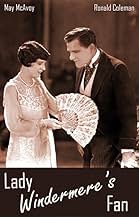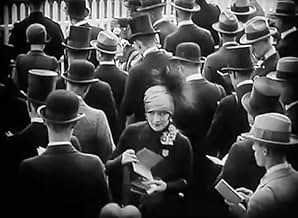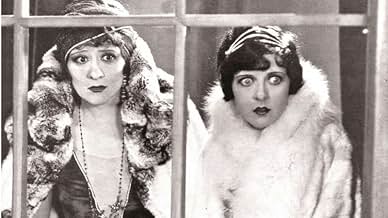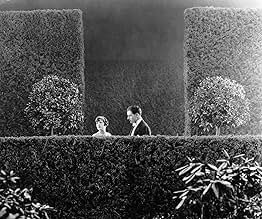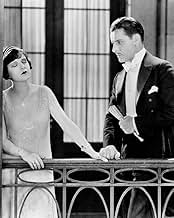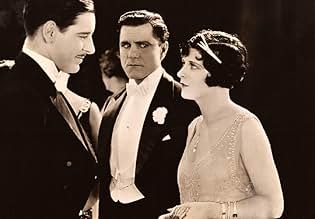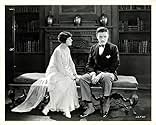ÉVALUATION IMDb
7,2/10
1,5 k
MA NOTE
Une femme mondaine croit que son mari la trompe, une méprise qui pourrait avoir des conséquences désastreuses pour tous les protagonistes.Une femme mondaine croit que son mari la trompe, une méprise qui pourrait avoir des conséquences désastreuses pour tous les protagonistes.Une femme mondaine croit que son mari la trompe, une méprise qui pourrait avoir des conséquences désastreuses pour tous les protagonistes.
- Prix
- 1 victoire au total
Edward Martindel
- Lord Augustus Lorton
- (as Edw. Martindel)
Carrie Daumery
- The Duchess of Berwick
- (as Mme. Daumery)
Billie Bennett
- Lady Plymdale
- (uncredited)
Michael Dark
- Party Guest
- (uncredited)
Helen Dunbar
- Mrs. Cowper-Cowper
- (uncredited)
Frank Finch Smiles
- Waiter with Party Guest List
- (uncredited)
Larry Steers
- Party Guest
- (uncredited)
Ellinor Vanderveer
- Party Guest
- (uncredited)
Percy Williams
- Waiter at the Party
- (uncredited)
Avis en vedette
An epigram-less silent screen version of Oscar Wilde by Ernst Lubitsch is likely to be a contest rather than a collaboration (and not surprisingly Lubitsch wins).
Irene Rich's handsome profile in the role of Mrs Erlynne provides a sight to savour throughout, and the race meet at which we see her from constantly switching viewpoints as people study her through their binoculars is one of the visual & cinematic highlights of the film.
Irene Rich's handsome profile in the role of Mrs Erlynne provides a sight to savour throughout, and the race meet at which we see her from constantly switching viewpoints as people study her through their binoculars is one of the visual & cinematic highlights of the film.
Ernst Lubitsch was a great director with many wonderful films, his early work (his German silents) is more interesting than great but when he hit his stride from the late-20s onwards his very distinctive directing style sparkled at its best. Oscar Wilde was a tremendously influential, perceptive and subversive writer, his work having much drollness and bite. Have for a long time appreciated silent films highly, while there are ones that don't hold up the ones that have are very good and the best landmarks.
'Lady Windermere's Fan' is an interesting Wilde play. It is not one of my favourite works of his, 'The Importance of Being Ernest', 'The Selfish Giant' and 'The Picture of Dorian Grey' connect with me more and am more familiar with them too, but it is unmistakably Wilde in characterisation and prose. This 1925 film adaptation is great on its own terms and even if Lubitsch went on to do even better later 'Lady Windermere's Fan' is by far one of his best and most interesting silent films (and to me one of his first great films).
Don't expect a film that is one hundred percent faithful to the source material. As said, there is a lot of heavy re-working. Not that that is a bad thing, it makes no difference to me actually, but it is merely a word of warning for anybody that thinks the opposite. It also feels more Lubitsch than Wilde, which is not necessarily a bad thing. Absolutely love Lubitsch's directing style, very much in full display, which is full of wit, sophistication and irony.
While Wilde's typically perceptive depiction of humanity and its nature and the insightful approach to his characters remain, there isn't quite enough of his own wit and subversiveness. There is absolutely evidence of them and the two styles generally don't clash surprisingly, but Lubitsch's directing makes more of a splash here.
Visually, 'Lady Windermere's Fan' looks great. Very sumptuously designed and costumed and there are some stylish shots that are expansive enough to avoid it from feeling too much of a filmed play or too claustrophobic. Lubitsch's direction is clever and elegant throughout, no rough around the edges feel or any signs of disinterest. It is very well performed and with more subtlety than a fair share of silent films from this period, with the best performance coming from Irene Rich as the most interesting character. She really does lighten up the screen.
All the conflicts are done with tension but also in a witty and sophisticated fashion, and the actors interact very naturally, no stiffness or disconnection here. The story is fun and charming, any harshness in the conflict done with bite and nuance. It goes at a lively enough pace, helped by that Lubitsch doesn't take the material too seriously, and doesn't get bogged down by staginess or over-reliance on anything that could potentially deaden the pace (i.e. title cards). The characters are interesting and Wilde's perceptive approach towards them is maintained.
On the whole, great. 9/10
'Lady Windermere's Fan' is an interesting Wilde play. It is not one of my favourite works of his, 'The Importance of Being Ernest', 'The Selfish Giant' and 'The Picture of Dorian Grey' connect with me more and am more familiar with them too, but it is unmistakably Wilde in characterisation and prose. This 1925 film adaptation is great on its own terms and even if Lubitsch went on to do even better later 'Lady Windermere's Fan' is by far one of his best and most interesting silent films (and to me one of his first great films).
Don't expect a film that is one hundred percent faithful to the source material. As said, there is a lot of heavy re-working. Not that that is a bad thing, it makes no difference to me actually, but it is merely a word of warning for anybody that thinks the opposite. It also feels more Lubitsch than Wilde, which is not necessarily a bad thing. Absolutely love Lubitsch's directing style, very much in full display, which is full of wit, sophistication and irony.
While Wilde's typically perceptive depiction of humanity and its nature and the insightful approach to his characters remain, there isn't quite enough of his own wit and subversiveness. There is absolutely evidence of them and the two styles generally don't clash surprisingly, but Lubitsch's directing makes more of a splash here.
Visually, 'Lady Windermere's Fan' looks great. Very sumptuously designed and costumed and there are some stylish shots that are expansive enough to avoid it from feeling too much of a filmed play or too claustrophobic. Lubitsch's direction is clever and elegant throughout, no rough around the edges feel or any signs of disinterest. It is very well performed and with more subtlety than a fair share of silent films from this period, with the best performance coming from Irene Rich as the most interesting character. She really does lighten up the screen.
All the conflicts are done with tension but also in a witty and sophisticated fashion, and the actors interact very naturally, no stiffness or disconnection here. The story is fun and charming, any harshness in the conflict done with bite and nuance. It goes at a lively enough pace, helped by that Lubitsch doesn't take the material too seriously, and doesn't get bogged down by staginess or over-reliance on anything that could potentially deaden the pace (i.e. title cards). The characters are interesting and Wilde's perceptive approach towards them is maintained.
On the whole, great. 9/10
In "Lady Windermere's Fan" the great Ernst Lubitsch may have bitten off a bit more than he can chew. First and foremost, how can you reproduce Oscar Wilde's witty dialogue in a SILENT FILM?? True, the famous 'Lubitsch touch' is apparent, but minus Wilde it becomes a romantic drama.
The players are excellent and above reproach, in particular Irene Rich as Mrs. Erlynne - in fact, it is basically her picture. A youthful Ronald Colman as Lord Darlington underplays his role but is urbane and charming (in truth, I have not read or seen the play before but that is my perception). I have always liked Colman in everything I have seen him in, but, of course, you can't hear his marvelous voice and diction here.
Despite these drawbacks I enjoyed the film and felt the photography was exceptionally good. I just felt it would have been even better with a soundtrack, as it lacks the requisite bite and panache.
Sadly, a drawing room comedy of manners such as "Lady Windermere's Fan" wouldn't work today, as modern day audiences would be baffled by the subtlety and lack of action. That may be why it hasn't been remade successfully in the sound era. I give it a rating of 7.
The players are excellent and above reproach, in particular Irene Rich as Mrs. Erlynne - in fact, it is basically her picture. A youthful Ronald Colman as Lord Darlington underplays his role but is urbane and charming (in truth, I have not read or seen the play before but that is my perception). I have always liked Colman in everything I have seen him in, but, of course, you can't hear his marvelous voice and diction here.
Despite these drawbacks I enjoyed the film and felt the photography was exceptionally good. I just felt it would have been even better with a soundtrack, as it lacks the requisite bite and panache.
Sadly, a drawing room comedy of manners such as "Lady Windermere's Fan" wouldn't work today, as modern day audiences would be baffled by the subtlety and lack of action. That may be why it hasn't been remade successfully in the sound era. I give it a rating of 7.
At first it might not seem as if the combination of Ernst Lubitsch and Oscar Wilde would work very well, but this silent-screen adaptation of Wilde's "Lady Windermere's Fan" is both enjoyable and well-crafted. Instead of clashing, Lubitsch's stylish, mischievous approach and Wilde's perceptive cynicism complement each other. The characters and the story are Wilde's, the acting and the style are Lubitsch's.
Although the material is heavily re-worked from the original play, Lubitsch's decisions all seem to work pretty well. Wilde's witty and resourceful dialogue is gone, but his insightful portrayals of human nature remain. Lubitsch also makes good use of the camera to bring off some shots that could not have worked on the stage. In particular, at times he makes the fateful fan seem almost a full-fledged part of the cast.
This movie version features solid performances by May McAvoy and Bert Lytell as the Windermeres, with a youngish-looking Ronald Colman suitably ingratiating as Lord Darlington. But Irene Rich has the most interesting character, and as Mrs. Erlynne she also gives a fine performance that particularly stands out in her scenes with the other characters. She and Lubitsch both capture the nature of her unpopular but admirable character, while carefully setting up the contrasts and conflicts between her and the other characters, who are in general more socially acceptable but far less worthy.
This also works well simply as an entertaining, often very amusing, and sometimes dramatically compelling story. For most silent film fans, it would definitely be worth tracking down and watching.
Although the material is heavily re-worked from the original play, Lubitsch's decisions all seem to work pretty well. Wilde's witty and resourceful dialogue is gone, but his insightful portrayals of human nature remain. Lubitsch also makes good use of the camera to bring off some shots that could not have worked on the stage. In particular, at times he makes the fateful fan seem almost a full-fledged part of the cast.
This movie version features solid performances by May McAvoy and Bert Lytell as the Windermeres, with a youngish-looking Ronald Colman suitably ingratiating as Lord Darlington. But Irene Rich has the most interesting character, and as Mrs. Erlynne she also gives a fine performance that particularly stands out in her scenes with the other characters. She and Lubitsch both capture the nature of her unpopular but admirable character, while carefully setting up the contrasts and conflicts between her and the other characters, who are in general more socially acceptable but far less worthy.
This also works well simply as an entertaining, often very amusing, and sometimes dramatically compelling story. For most silent film fans, it would definitely be worth tracking down and watching.
'Lady Windermere's Fan' is one of the great plays of Oscar Wilde, so it is curious to see it here as a big budget silent film from Warners Brothers. Starring May McAvoy and Bert Lytell as the Windermeres, with Irene Rich as Mrs Erlynne and a young Ronald Colman as Lord Darlington, this film is directed by Ernst Lubitsch, known mainly now for his stylish musicals and dramas from the sound era.
Despite the obvious drawback of not using any of Wilde's text, either spoken or as title cards, this adaptation does succeed in putting across most of the play's plot, just making a little tweak here and there to move the plot along or to bring matters to a satisfactory conclusion. Sets and costumes are of the jazz age and are beautiful, and McAvoy is a winsome Lady Windermere, all indignant eyes and little rosebud mouth.
The film however belongs to Irene Rich who portrays Mrs Erlynne as desperate, calculating, and everything in-between. She was a superb technician without overacting, and it's a pleasure to watch her. Ronald Colman as well shows signs of the star quality to come.
This 'Lady Windermere' is well worth watching.
Despite the obvious drawback of not using any of Wilde's text, either spoken or as title cards, this adaptation does succeed in putting across most of the play's plot, just making a little tweak here and there to move the plot along or to bring matters to a satisfactory conclusion. Sets and costumes are of the jazz age and are beautiful, and McAvoy is a winsome Lady Windermere, all indignant eyes and little rosebud mouth.
The film however belongs to Irene Rich who portrays Mrs Erlynne as desperate, calculating, and everything in-between. She was a superb technician without overacting, and it's a pleasure to watch her. Ronald Colman as well shows signs of the star quality to come.
This 'Lady Windermere' is well worth watching.
Le saviez-vous
- AnecdotesOne of the 50 films in the three-disk boxed DVD set called "More Treasures from American Film Archives, 1894-1931" (2004), compiled by the National Film Preservation Foundation from five American film archives. This film is preserved by the Museum of Modern Art, has a running time of 89 minutes and an added piano music score.
- Citations
Opening title card: Lady Windermere faced the grave problem of seating her dinner guests.
- ConnexionsFeatured in Historia del cine: Epoca muda (1983)
Meilleurs choix
Connectez-vous pour évaluer et surveiller les recommandations personnalisées
- How long is Lady Windermere's Fan?Propulsé par Alexa
Détails
- Date de sortie
- Pays d’origine
- Langue
- Aussi connu sous le nom de
- Tajna ledi Vindermir
- Lieux de tournage
- Toronto, Ontario, Canada(Racetrack Scene)
- société de production
- Consultez plus de crédits d'entreprise sur IMDbPro
Box-office
- Budget
- 320 000 $ US (estimation)
- Durée2 heures
- Mixage
- Rapport de forme
- 1.33 : 1
Contribuer à cette page
Suggérer une modification ou ajouter du contenu manquant

Lacune principale
By what name was Lady Windermere's Fan (1925) officially released in Canada in English?
Répondre
